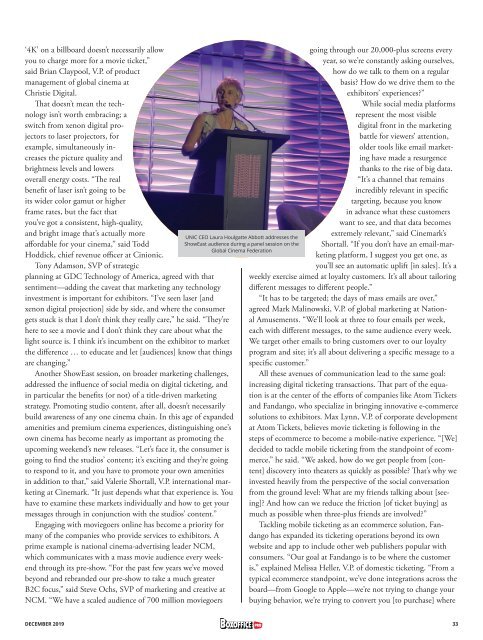Boxoffice Pro - December 2019
The Official Magazine of the National Association of Theatre Owners
The Official Magazine of the National Association of Theatre Owners
You also want an ePaper? Increase the reach of your titles
YUMPU automatically turns print PDFs into web optimized ePapers that Google loves.
‘4K’ on a billboard doesn’t necessarily allow<br />
you to charge more for a movie ticket,”<br />
said Brian Claypool, V.P. of product<br />
management of global cinema at<br />
Christie Digital.<br />
That doesn’t mean the technology<br />
isn’t worth embracing; a<br />
switch from xenon digital projectors<br />
to laser projectors, for<br />
example, simultaneously increases<br />
the picture quality and<br />
brightness levels and lowers<br />
overall energy costs. “The real<br />
benefit of laser isn’t going to be<br />
its wider color gamut or higher<br />
frame rates, but the fact that<br />
you’ve got a consistent, high-quality,<br />
and bright image that’s actually more<br />
affordable for your cinema,” said Todd<br />
Hoddick, chief revenue officer at Cinionic.<br />
Tony Adamson, SVP of strategic<br />
planning at GDC Technology of America, agreed with that<br />
sentiment—adding the caveat that marketing any technology<br />
investment is important for exhibitors. “I’ve seen laser [and<br />
xenon digital projection] side by side, and where the consumer<br />
gets stuck is that I don’t think they really care,” he said. “They’re<br />
here to see a movie and I don’t think they care about what the<br />
light source is. I think it’s incumbent on the exhibitor to market<br />
the difference … to educate and let [audiences] know that things<br />
are changing.”<br />
Another ShowEast session, on broader marketing challenges,<br />
addressed the influence of social media on digital ticketing, and<br />
in particular the benefits (or not) of a title-driven marketing<br />
strategy. <strong>Pro</strong>moting studio content, after all, doesn’t necessarily<br />
build awareness of any one cinema chain. In this age of expanded<br />
amenities and premium cinema experiences, distinguishing one’s<br />
own cinema has become nearly as important as promoting the<br />
upcoming weekend’s new releases. “Let’s face it, the consumer is<br />
going to find the studios’ content; it’s exciting and they’re going<br />
to respond to it, and you have to promote your own amenities<br />
in addition to that,” said Valerie Shortall, V.P. international marketing<br />
at Cinemark. “It just depends what that experience is. You<br />
have to examine these markets individually and how to get your<br />
messages through in conjunction with the studios’ content.”<br />
Engaging with moviegoers online has become a priority for<br />
many of the companies who provide services to exhibitors. A<br />
prime example is national cinema-advertising leader NCM,<br />
which communicates with a mass movie audience every weekend<br />
through its pre-show. “For the past few years we’ve moved<br />
beyond and rebranded our pre-show to take a much greater<br />
B2C focus,” said Steve Ochs, SVP of marketing and creative at<br />
NCM. “We have a scaled audience of 700 million moviegoers<br />
UNIC CEO Laura Houlgatte Abbott addresses the<br />
ShowEast audience during a panel session on the<br />
Global Cinema Federation<br />
going through our 20,000-plus screens every<br />
year, so we’re constantly asking ourselves,<br />
how do we talk to them on a regular<br />
basis? How do we drive them to the<br />
exhibitors’ experiences?”<br />
While social media platforms<br />
represent the most visible<br />
digital front in the marketing<br />
battle for viewers’ attention,<br />
older tools like email marketing<br />
have made a resurgence<br />
thanks to the rise of big data.<br />
“It’s a channel that remains<br />
incredibly relevant in specific<br />
targeting, because you know<br />
in advance what these customers<br />
want to see, and that data becomes<br />
extremely relevant,” said Cinemark’s<br />
Shortall. “If you don’t have an email-marketing<br />
platform, I suggest you get one, as<br />
you’ll see an automatic uplift [in sales]. It’s a<br />
weekly exercise aimed at loyalty customers. It’s all about tailoring<br />
different messages to different people.”<br />
“It has to be targeted; the days of mass emails are over,”<br />
agreed Mark Malinowski, V.P. of global marketing at National<br />
Amusements. “We’ll look at three to four emails per week,<br />
each with different messages, to the same audience every week.<br />
We target other emails to bring customers over to our loyalty<br />
program and site; it’s all about delivering a specific message to a<br />
specific customer.”<br />
All these avenues of communication lead to the same goal:<br />
increasing digital ticketing transactions. That part of the equation<br />
is at the center of the efforts of companies like Atom Tickets<br />
and Fandango, who specialize in bringing innovative e-commerce<br />
solutions to exhibitors. Max Lynn, V.P. of corporate development<br />
at Atom Tickets, believes movie ticketing is following in the<br />
steps of ecommerce to become a mobile-native experience. “[We]<br />
decided to tackle mobile ticketing from the standpoint of ecommerce,”<br />
he said. “We asked, how do we get people from [content]<br />
discovery into theaters as quickly as possible? That’s why we<br />
invested heavily from the perspective of the social conversation<br />
from the ground level: What are my friends talking about [seeing]?<br />
And how can we reduce the friction [of ticket buying] as<br />
much as possible when three-plus friends are involved?”<br />
Tackling mobile ticketing as an ecommerce solution, Fandango<br />
has expanded its ticketing operations beyond its own<br />
website and app to include other web publishers popular with<br />
consumers. “Our goal at Fandango is to be where the customer<br />
is,” explained Melissa Heller, V.P. of domestic ticketing. “From a<br />
typical ecommerce standpoint, we’ve done integrations across the<br />
board—from Google to Apple—we’re not trying to change your<br />
buying behavior, we’re trying to convert you [to purchase] where<br />
DECEMBER <strong>2019</strong><br />
33

















